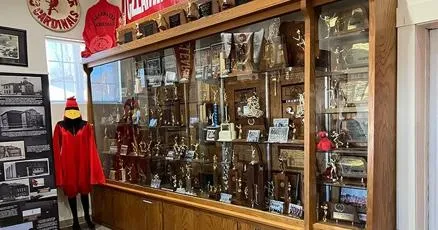CLEARWATER -- A historic building in a North Central Nebraska village now houses artifacts from that village's past.
Clearwater, with a population of around 400, was platted in October 1888 and, not surprisingly, named after the "clear water" running in a nearby creek. Situated around 45 miles northwest of Norfolk, the community provides the needs of area farmers and ranchers.
In 1928, the Contois Service Station opened on what is now the south end of Main Street, blocks away from Highway 275. But in 1928, the station sat along the Blue Pole Road, one of the state's earliest highways, although then most of what were considered highways were just dirt roads. The road came about through the "Good Roads Movement," which was an effort around the country to build a system of reliable roads. In many cases, instead of highway signs used today, the highway's path was marked with an emblem on a telephone pole or a marker planted along the side of the road.
The idea of the Blue Pole Road was first talked about in 1912. By 1921, the road extended from Omaha through Fremont, Norfolk, Clearwater, Ainsworth, Valentine, Hay Springs and Chadron. Four years later, it was extended south to Omaha. It was replaced by Highway 275, which was extended into northern Nebraska from Iowa and Missouri in 1939.
When it was operational, the Contois Brothers Service Station offered showers and restrooms, a luxury for travelers. After the station closed, the 500-square-foot building housed a beauty parlor, telephone office, chainsaw repair building, storage garage and more.
Eventually, time took its toll and the building basically fell apart, said Kathy Patras, a longtime Clearwater resident and historical society member.
When village officials threatened to tear down the dilapidated building, LuAnn Schindler, publisher of the Summerland Advocate-Messenger, wrote an editorial that rallied the troops and garnered support for saving the historic structure.
"I wrote, 'I don't know what we'll do with it, but we're going to save it. It's the anchor of Main Street,' " she said.
Village trustees agreed and offered to lease the building to the newly formed Clearwater Historical Society -- a nonprofit organization formed to save the building -- for $1 a year. They also offered to pay the utilities.
After that, committee members organized fundraising events, solicited donations and oversaw the building’s restoration.
"Structurally, it was sound," said Carla Jacob, a historical society member. However, plenty of work needed to be done before it could be used. In the end, the original lathe and plaster were replaced with drywall, new electrical and plumbing systems were installed, the roof was replaced and new concrete was poured.
About the same time the former service station was being restored, the Clearwater Public Schools was merging with the Orchard and Ewing school systems. In 2020, the three schools formed Summerland Public Schools and, in the fall of 2021, the school began operations in a new structure built for that purpose.
Shortly after, the building that had housed Clearwater's school since the 1980s was sold. While some of the memorabilia from the school was moved to the new Summerland building, much remained and needed a new home.
"We had to figure out what to do with all of this stuff," Jacob said.
Which is why the new Clearwater Museum now houses trophies, banners, photographs, yearbooks and many school-related items. It's also home to a bowling ball and pins from the bowling alley Jacob's parents owned, a stop light that once hung near the railroad crossing, old telephones and more.
After all, it's not just a school museum; it's meant to tell the history of the community. Consequently, historical society members are accepting artifacts important to Clearwater's history.
"It just came together ... it's the perfect building," Schindler said.
The museum is open during community celebrations and special events or by appointment. For information, call Schindler at 402-851-0054 or Patras at 402-841-6544.
